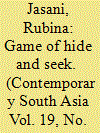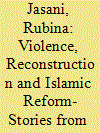| Srl | Item |
| 1 |
ID:
107219


|
|
|
|
|
| Publication |
2011.
|
| Summary/Abstract |
This paper analyses the gendered experience of the state for the Muslim survivors of violence in Gujarat in 2002. Most of the scholarship on the working of the state after communal violence in post-independence India concentrates on the anxiety to re-instate the 'myth of the state', through policies that establish its respectability after violence. The emphasis is on understanding the mechanics of the state, its 'order making' function. Very little attention has been paid to understanding the lived experience of the modern state from a gendered perspective. What studies there have been tend to focus on the internal power structures within nationalist discourses, the patriarchal nature of state assertion, and point to forgotten narratives within the meta-narratives of violence and suffering. There is very little evidence examining how men and women experienced the same process differently, or how they make sense of their experiences, in a context where the lines between order and chaos, legitimacy and illegitimacy and trust and betrayal were constantly being redrawn. In examining memories of loss and suffering, this paper shows the contrasting and shifting ways in which the state is experienced, imagined and granted legitimacy by men and women from the margins.
|
|
|
|
|
|
|
|
|
|
|
|
|
|
|
|
| 2 |
ID:
082167


|
|
|
|
|
| Publication |
2008.
|
| Summary/Abstract |
This paper is a critique of popular and academic assumptions about the Muslim 'community' and Islamist organizations, especially in the context of displacement and reconstruction after the 2002 riots in Ahmedabad, western India. It explores the internal politics of Jamaat-led organizations and the engagement of survivors with ideas of reform and piety. Contesting contemporary understandings of reformist Jamaats, I argue that the growing influence of the latter organizations had little co-relation with their resettlement plans and policies. The reconstruction patterns were more closely linked to the history of labour migration to the city, and the subsequent movement of violence-affected people from the mill areas to larger Muslim ghettoes. My ethnography shows how the survivors strategically engaged with reform initiatives and negotiated with local Islamist organizations for 'safe housing'. By illustrating certain ambiguities within the everyday practices of Islam, my paper also problematizes notions of 'piety' and 'agency', primarily after people's experiences of communal violence.
|
|
|
|
|
|
|
|
|
|
|
|
|
|
|
|